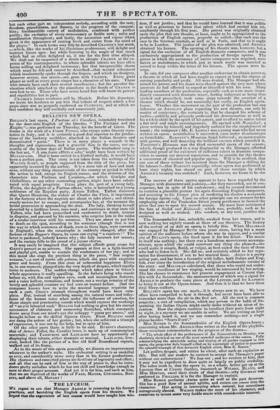BELLINI'S NEW OPERA.
BELLINI'S last opera, I Puritani ed i Cavalieri, inimitably translated by the doer-into- English of the libretto, " The Puritans and the .Knights "—was performed on Thursday, for the benefit of GRIST. The drama is the work of a Count PEPOLT, who enjoys some literary repu- tation in Italy ; and it is certainly a good deal superior to the produc- tions of the hackney scribblers attached to the Italian theatres and denominated " poets." There is in many places a warmth in the thoughts and expressions, and a graceful flow in the verse, not un- worthy of the better days of Italian poetry. The troubadour song in the last act, " A una fonte &Mitt° e solo," might have been written by METASTASIO. Had it been united to a kindred melody, it would have been a perfect gem. The story is not taken from the writings of Sir WALTER SCOTT, as people supposed from the title of the piece, but apparently invented by the author. It is a mere tale of love and mad. ness, without any thing characteristic of the country or period in which the action is laid, except its English names, and the division of the characters into Puritans and Cavaliers,—for which Guelphs and Ghibellines, or any other contending parties, might have been substi- tuted with equal propriety. Geist plays the part of a young lady, Elvira, the daughter of a Puritan officer, who is betrothed to a young nobleman of the Royalist party, Arturo Talbot. Talbot discovers that Queen Henrietta, the widow of Charles the First, is imprisoned in the fortress where the nuptials are about to take place ; and chival- rously assists her to escape, and accompanies her, at the moment the bridal procession is approaching the altar. The lady, thinking herself deserted by a faithless lover, runs mad ; and continues in that state till Talbot, who bad been proscribed and condemned to death, returns in disguise, and pursued by his enemies, who surprise him in the midst of a tender interview with his mistress. They are about to put him to death on the spot, according to his sentence (though that is not the way in which sentences of death, even in those days, were executed in England), when the catastrophe is suddenly changed, after the fashion of the Beggar's Opera, by some one crying " a reprieve !" The lover is pardoned, nobody knows why ; the lady recovers her senses; and the curtain falls to the sound of a joyous chorus.
It may easily be imagined that this subject affords great scope for Games powers as an actress. She appears at first as a light-hearted and playful girl, unable to contain the exuberance of her joy; and in this mood she sings the prettiest thing in the piece, " Son vergine vezzosa,"—a sort of rondo alla polacca, which she gave with exquisite grace and beauty. From this state of unbounded happiness Elvira is, in one moment, plunged into the very depth of despair, which rapidly turns to madness. The sudden change which takes place in GRISI'S whole appearance is really appalling. In the forlorn being who stands before us, with dim and rayless eyes, sunk and meaningless features, and a voice hollow, tremulous, and hoarse, not a vestige remains of the lovely and splendid creature we had seen an instant before. Had the
composer known how to write the musical language requisite for such a part, GRISI'S triumph throughout would have been com- plete. But, instead of searching among the natural tones and inflec- tions of the human voice when under the influence of emotion, for those simple and penetrating sounds which would express the workings of "an o'er laboured soul," BELLrNI had nothing to give but his eternal succession of elaborate and unmeaning flourishes, which constantly drove away from our mind's eye the unhappy " pazza per amore," and brought before us the skilful Signora Gain. Even BELL'S' could not damp the ardour of her genius ; but, when she achieved a triumph of expression, it was not by his help, but in spite of him.
Of the other parts there is little to be said. RUBINI'S character, that of Arturo Talbot, the Cavalier lover, is made up of commonplace materials; and TAMBURINI and LABLACHE have no opportunity of displaying their talents, either dramatic or musical. LABLACIIE, how- ever, looked like the picture of a fine old bluff Roundhead captain, walked out of its frame.
As to the music of this opera generally, we discern no improvement
whatever in the author's style. His orchestral writing is as unskilful as ever, and considerably more noisy than in his former productions. His choruses and concerted pieces are destitute of ingenuity and effect ; and all that can be said of him in the way of praise is, that he intro- duces pretty melodies which he has not skill and knowledge enough to turn to their proper account. And yet it is for him, and such as him, that we are deprived of the works of PARR, MAYER, CIMAROSA, Ros- sew, and above all, Itiozawr !


























 Previous page
Previous page